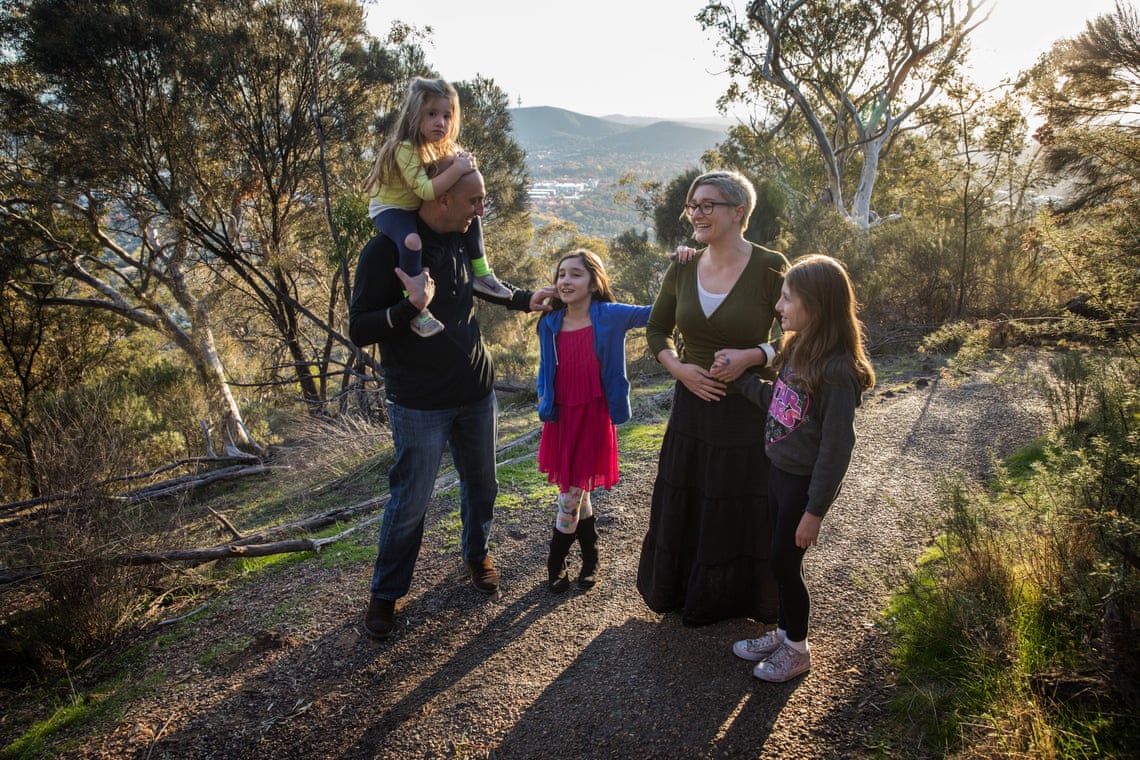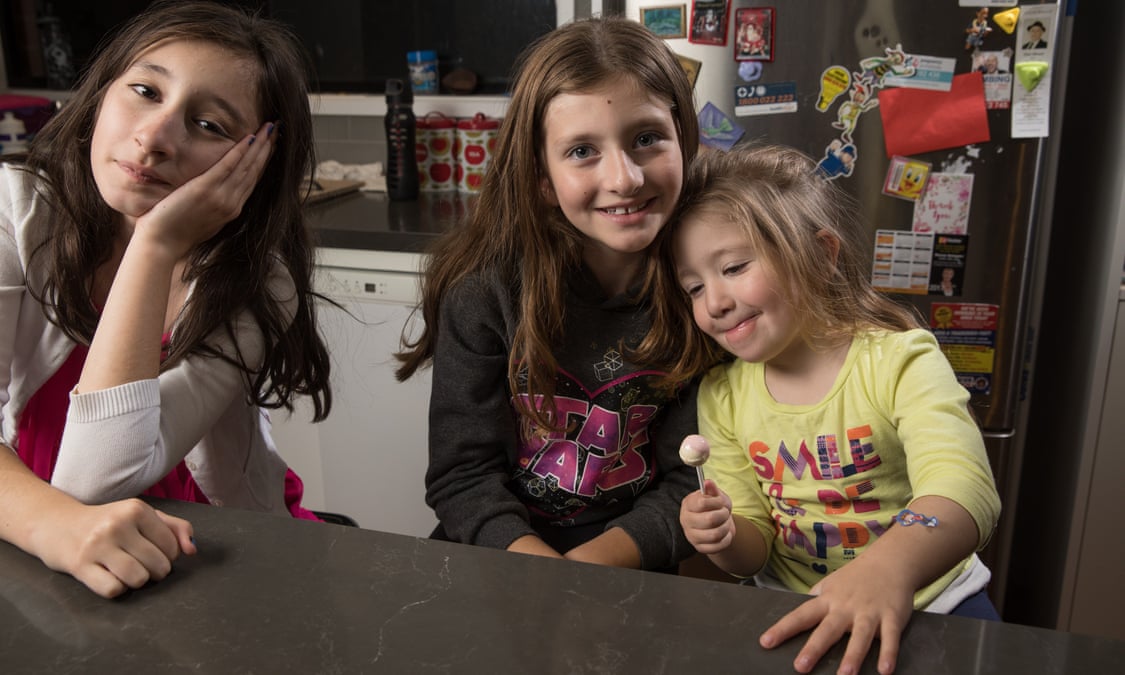Paul Mitry moved to Canberra with his wife and three daughters – aged nine, seven and three – at the end of last year. It had been a long time coming, he admits. “For five years my wife had been going, ‘Have you thought about Canberra?’”
The capital city was her hometown; Mitry’s was Sydney. His “whole life” is there, he says – his ageing parents, extended family, old friends – and he was reluctant to leave.
The tipping point came when the couple went to trade the two-bedroom townhouse they had bought in Riverwood in 2006 for something more spacious. Even with hundreds of thousands of dollars of equity, they were quickly forced to compromise on quality and location.
Mitry remembers going to view a “suburban shack, a hole in the ground” with nearly 100 other people, lined up down the street: “I couldn’t even find a parking spot.
“There were many moments when I knew this is over, I’m not going to do this any more, but that’s the one that stands out.”
He hung on in Sydney for a further four or five years before accepting that, in order to own a family home, both he and his wife would have to work full-time and all three children would have to attend before- and after-school care.
It was “just the most ridiculous approach to life”, Mitry says.
“I was almost going to commit to not having breakfast with my kids on weekdays. That, to me, was the defining moment: did I want to watch my kids grow up, or did I want to hear about it from carers and my wife?”
Many in Australia’s largest city are finding themselves faced with the same trade-off between free time, disposable income, quality of life – and simply keeping a foot on the property ladder.
Never mind attempting to get on it in the first place. With the median house price now just shy of $1m, those shut out of the market must absorb rising rents, or move elsewhere.
In a lose-lose situation, an obvious question arises: why stay?
“Financially, yes, it was an easy decision,” Mitry says. “But money was only a part of the spreadsheet of factors we made.”
He admits to feeling “a little bit homesick” for Sydney but has no doubts that the move was the right one. Their Riverwood townhouse sold for $650,000 and they bought their 750 sq m “forever home” in Canberra for $600,000. The mortgage is “extremely manageable” even after a family holiday to London – something that didn’t seem possible in Sydney.
“Every time I make a joke about how quiet it is down here, you’re reminded very quickly that you would be paying $1.2m for a house that required renovating every year, instead of going on holiday.”
And he marvels at his new quality of life.
“The kids can walk to school – that just blew my mind, the first time I let them do that. The neighbours brought round cookies. I’ve never seen anything like it.”
It’s ironic given that capital-Q, capital-L “Quality of Life” is a metric by which Sydney consistently scores highly. In March it tied for 10th in Mercer’s survey of 450 cities, ahead of Amsterdam, Berlin and Melbourne (which tied with Toronto at 16).
But its overpriced property market puts that reputation at risk. A city’s political stability, education and health services, public transport, arts and culture scene, natural beauty – all are incidental if people can’t picture a future there.
Mitry says superficial comparisons between the life he chose in Canberra and the one that was available to him in Sydney distract from the crux of the issue: “the bloody price of the houses”.
He knows couples who have moved in with their parents, children in tow, to save for a deposit. As hard as it was for him to move away from his own parents, he reasoned being better off would allow him to provide for them in future.
“I can’t believe how much Sydney has changed, how difficult it is to have a simple life and raise your family,” he says. “It’s not too much to ask for both parents to be able to work really hard and have a nice, or half-decent, house to show for it.
“It just seems a little bit ridiculous. People who work really hard, who are supremely qualified and good at their jobs, who are really good with money – they’re still priced out of the market.”
Among Sydney residents, home ownership is often spoken about as though mutually exclusive with a professional career, or even urban living. Shut out of the property market, people joke about moving to Wagga Wagga or Gundagai as though affordable housing would be the only reason someone would ever opt to live in a small rural town.
It’s hard to have perspective while inside a bubble, but in reality, Sydney is an anomaly. Since December 2011, median house prices have risen by 36% in Melbourne and 30% in Canberra – in Sydney, it is 82%. Other figures suggest house values have increased by nearly 20% in just the past 12 months.
In such a grossly inflated market, the conventional wisdom for aspiring first-home owners – to start small in desirable suburbs, to scrimp on small pleasures – does not apply.
Mitry is sympathetic towards young people forced to make decisions and trade-offs that, at their age, he was free to put off. “I was thinking about nothing when I was 20, 25 – maybe, what pub are we going to go to on Friday?
“But I was still in a position where I could get my act together for a few years and get a bank to give me a mortgage.”
According to research by the Foundation for Young Australians, the average Sydney homebuyer in 2015 had to save for 15 years to raise a deposit, compared with six years in 1985. The average home loan in 2015 was 134% of the average disposable household income, compared with just 32% 30 years ago.
Given the sacrifices involved, it’s hardly surprising that many 20- and even 30-somethings in Sydney now do not think of home ownership as a priority, or even a possibility.
As a self-described “low-income earner” Georgia Leaker, 28, has never considered owning her own home as an option, in Sydney or elsewhere. In the past five years she has worked primarily as a copywriter, often in short-term roles. Her highest salary has been $45,000.
A month ago she was made redundant. Shortly afterwards, she called time on Sydney. “It’s got to a point where the rising costs around me have made Sydney nearly unliveable for me,” she says.
She considers herself fortunate to have found a central apartment in the inner city suburb of Darlinghurst for well below market rent, and has followed a rigorous budget to afford an overseas holiday every year. “But it’s exhausting – I want a bit more flexibility in my week instead of having to constantly say no to things.”
In a couple of weeks Leaker will move back to her hometown of Melbourne. She figures it will mean an extra $150 in her pocket a week, mostly from reduced rent. She is hopeful more disposable income in a “less cut-throat” city will ease her anxiety.
“Sydney’s been a bit of a shitfight … In the last five years, I’ve had a lot of highs but it’s still been, ‘Let’s kick you down again!’ I’m looking for a break, emotionally and financially.”
Her timeline may have been brought forward but leaving Sydney before her 30th birthday had felt inevitable, she says.
“I was a little bit sick of the rising cost of housing, and the fact that I just didn’t feel I was any further along with my career – like I’m just another one of those people in their 20s who can’t get their shit together.
“Not that there’s anything wrong with that,” she adds. “I think there are more of us than I think, say, my parents would want to admit. They’re starting to realise that it’s not just me, it’s symptomatic of a larger problem.”
It is inaccurate to frame Sydney’s housing affordability crisis as a generational issue when even people already on the property ladder are getting knocked off.
When it came time to leave his two-bedroom apartment in Artarmon to accommodate his young family, Andrew Whitehead was prepared to move further out of the city. But even on the central coast, he and his wife found the houses overpriced – and made less attractive by a 90-minute one-way commute to work.
“It just seemed silly to us to do that, so we decided to get out of Sydney.”
Melbourne, Adelaide and, in New Zealand, Wellington and Auckland were all possibilities. “We didn’t really have connections in any other city, so it was going to be a fresh start wherever we went,” he says. “We thought, if we’re going to move somewhere, we’ll move to a city that we like.”
Moving to a new city had the added appeal of being “a bit outside the box”, too. “Choosing to stay in Sydney but go out to the suburbs felt so much like what my parents did as well, and you could tell they weren’t ever happy,” Whitehead says. “They were just grinding away and paying the mortgage.”
The decision of destination was made for them when Whitehead was offered a job in Wellington with the same salary as in Sydney. In January, he and his wife crossed the Tasman with their children, now aged two and a half and nine months.
As well as retaining the apartment in Artamon as an investment, they rent a house in Tawa, a 17-minute train ride from Whitehead’s workplace. While it’s a significantly smaller city, the quality of life in Wellington is similar to that in Sydney, he says – they just have more time and money with which to enjoy it.
“Sydney has got a good cultural scene … great weather, nice beaches, that kind of thing. But when you’ve got a family, we didn’t go into the city any more. I hadn’t been to the beach in nine months.
“It was more important for us to have somewhere to settle that’s close to work and we can afford to pay off.”
Whitehead admits to being in the “honeymoon period” with his new home, and the past few months have passed quickly thanks to a steady stream of visitors from Australia.
He had not wanted to leave Sydney, he says. But the cost of living there proved more than a matter of money.
“Realistically, it just doesn’t make sense,” he says, sounding defeated. “I can’t justify staying in the city, increasing my mortgage, and then travelling an extra hour every day to do it, and never seeing my family.
“All those things are so silly. We could just go somewhere else and it be relaxed and nice.”
But it wasn’t as obvious a decision as it sounds. With some self-awareness, Whitehead describes a spreadsheet he made, weighing the different factors for each possible destination according to how important to him they were: an attempt at a “really rational decision-making process”, he says.
“Sydney came out on top.”



